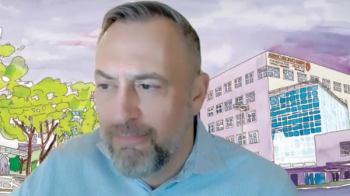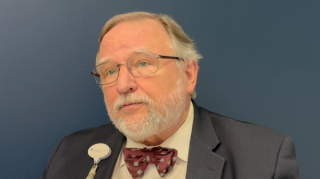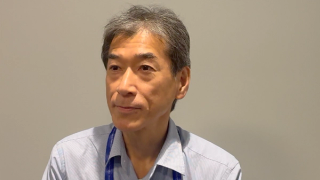![According to John Henson, MD, “What we need are better treatments to control the [brain] tumor once it’s detected.”](https://cdn.sanity.io/images/0vv8moc6/cancernetwork/e0d29c38bb732429ae370e4ef7d1829a10c96446-2992x1684.png?w=320&fit=crop&auto=format)
Brain Cancer
Latest News
Latest Videos
![According to John Henson, MD, “What we need are better treatments to control the [brain] tumor once it’s detected.”](https://cdn.sanity.io/images/0vv8moc6/cancernetwork/e0d29c38bb732429ae370e4ef7d1829a10c96446-2992x1684.png?w=320&fit=crop&auto=format)
Shorts
Podcasts
CME Content
More News


Among the 12 patients with suspected brain metastases treated with RAD 101, the images showed metabolic activity in brain metastases compared with MRI findings.

Treatment with IGV-001 demonstrated a 45% increase in overall survival compared with standard of care in patients with newly diagnosed glioblastoma.

Edward Chu, MD, a member of the gastrointestinal editorial advisory board, died of glioblastoma in November.

One patient with newly diagnosed glioblastoma multiforme reached 3 years of survival following treatment with temferon in a phase 1/2a trial.

Data from a phase 1 trial demonstrate the safety and feasibility of administering chlorotoxin-based cellular therapy to those with recurrent glioblastoma.

While more work must be done to minimize toxicity, antibody-drug conjugates have demonstrated benefits for patients with glioblastoma.

Interim data from the phase 1b CLOVER-2 trial evaluating iopofosine I 131 in children and adults with high-grade glioma supported the FDA’s decision.

The evaluation of MT-125’s safety and preliminary activity in glioblastoma is underway in a phase 1/2 trial.

Data from the phase 3 ROADS trial show significant gains in efficacy without increases in safety concerns following the use of GammaTile.

A patient case of a 76-year-old man with a rare glioblastoma variant showcased the importance of molecular profiling in diagnosing and guiding treatment for brain tumors.

Results from a pilot phase 2 trial showed that all 5 patients who received treatment achieved a response or had stable disease.

Historical standards for H3K27M-mutant diffuse midline glioma treatment may harm healthy central nervous system cells, according to Ashley L. Sumrall, MD.

Supporting data for the accelerated approval of dordaviprone come from 5 open-label trials in H3 K27M-mutant diffuse midline glioma.

Updated guidelines from ASTRO recommend various radiation therapy techniques for patients with WHO grade 4 adult-type diffuse glioma.

The system showed enhanced diagnostic accuracy of intraoperative imaging, potentially improving the extent of resection while reducing residual disease.

“Dendritic cell vaccines, CAR T-cell therapy, and things of that nature are holding some promise,” said Andrew Brenner, MD, PhD.

Andrew Brenner, MD, PhD, stated that rhenium obisbemeda elicited similar results in leptomeningeal disease as it did in recurrent glioma.

Patients with recurrent glioblastoma who had an absorbed dose of greater than 100 Gy with rhenium obisbemeda had a median overall survival of 17 months.

According to Andrew Brenner, MD, PhD, rhenium obisbemeda can be detected via SPECT imaging and aids in the care of patients with glioblastoma.

The developer plans to share top-line results for RAD101 in various solid tumors from the supporting phase 2b trial in the second half of 2025.

The safety profile of iopofosine I 131 in the phase 1b CLOVER-2 trial appears consistent with prior reports of the agent.

Specialties including neurosurgery, radiation oncology, and neurorehabilitation all play a notable role in the care of patients with brain tumors.

Treatment-related toxicities during neuro-oncology therapy appear well managed with dose modifications and treatment cycle holds.

CAR T-cell therapies appear to be an evolving modality in the treatment of those with intracranial tumors, said Sylvia Kurz, MD, PhD.



















































